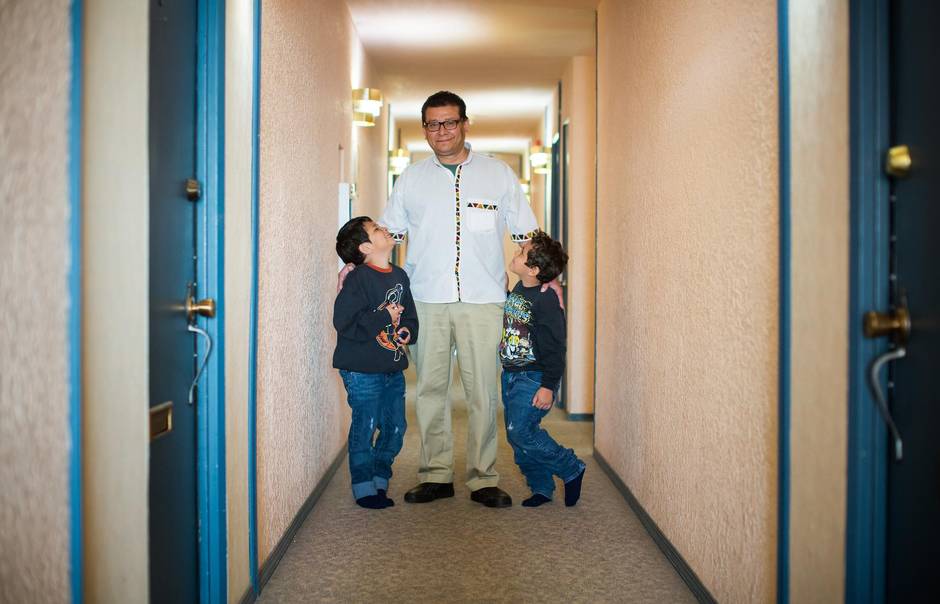
BC’s broken Residential Tenancy system adds insult to demoviction in Burnaby

On July 1, 2016 Martin Lenin Fernandez, his elderly mother, and two young sons were evicted from a one-bedroom apartment on Imperial Street in the Metrotown area of Burnaby. A condo development company called Amacon bought the building where he lived and the City of Burnaby awarded them a rezoning and density bonus so they could tear down the 3-storey walk-up rental apartment building and replace it and the three similar buildings around it with a condo tower. The Amacon evictions became ground zero for the anti-demoviction movement as activists occupied the empty apartments.
Martin spoke out in the media and became a face of the anti-demovictions fight. Others received their damage deposits back from Amacon – some after the requisite two weeks, and others only after two months. But Martin didn’t receive his at all. “They’re doing this to give me a hard time,” he said.
Martin filed with the RTB on July 21, 2016, three weeks after leaving his apartment. He received a hearing date of January 20, 2017, exactly 6 months later. But the tenancy law did not delay its demand he pay a new damage deposit for the new apartment he managed to find, also in the Metrotown area and also vulnerable to demoviction under the City’s plan to rezone the whole area for condo development.
In Martin’s new apartment all the water taps leak, including the toilet and shower, and the heat only works sometimes. But, he asks, “why file a complaint with the RTB when it takes 6 months to get a hearing?” His experience with RTB delays for tenant’s issues adds to the feeling he already had that the decks are stacked against tenants. He says that friends and neighbours who have taken complaints to the RTB felt like the arbitrator was taking the landlord’s side and that tenants needed a lot more proof than landlords in order to win a hearing.
In the spring of 2016, the Stop Demovictions Burnaby Campaign did a door-to-door survey and spoke with 60 tenants facing demoviction. On top of the other stresses of being evicted, a consistent complaint was that when developers bought apartment buildings they stopped doing basic repairs. In some cases there were years between a developer buying the building and finally evicting it and tearing it down for condos. In the course of those years, tenants reported, developer-landlords stopped repairing leaks from pipes or roofs, let washing machines break down, and stopped keeping up paint jobs and hallway rugs. By the time the rezoning hearing came, City Councilors could point to the run down conditions of the building.
The gaps and delays in the RTB system work well for landlords who want to justify the mass eviction and demolition of their buildings, but it doesn’t work well for tenants who don’t have the money to pay rent, moving expenses, plus a security deposit. Under the financial pressure of moving to a more expensive place plus finding money for the damage deposit all while being out of work due to a work injury, Martin was late with the rent. The eviction notice came fast, and this time there was much less delay in the RTB hearing – it was set for 6 weeks after Martin missed rent. A Tyee story by Andrew MacLeod says that the RTB system holds 20,000 tribunals a year, more than any other level of court in BC. The fact that the landlord’s eviction hearing was set 6 weeks later shows just how overloaded the RTB system is. Martin made his rent before the hearing and avoided eviction, but the incident demonstrates the priorities of BC’s residential tenancy system.
As Martin’s six-month delayed hearing approaches, Martin said that he feels completely disillusioned with the RTB system. “If we owe the landlord money then the law throws us out fast. But if the landlord owes us money then the law takes a long time, or we never get it,” he says. “The Residential Tenancy Act is used against us but we can’t use it for our own defense. The law is on the landlord’s side, not the tenant’s side.”
The RTB’s default favoring of landlords means that tenants have less access to justice. Reforms and renewed funding for the Residential Tenancy system in BC would not stop demovictions – that would require policy changes at the municipal level – but the provincial government could lessen the indignities of abuse that are so available to landlords and so difficult for tenants to fight.
